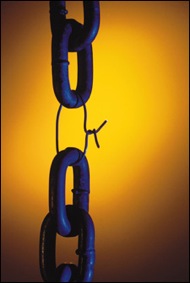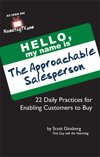 “Love is never having to say you’re sorry.”
“Love is never having to say you’re sorry.”
This phrase originated in the movie Love Story, but has since been modified, satirized, patronized and reorganized through dozens of movies, songs, television shows and other popular art forms.
I wonder if there are other things we never have to do?
In business, in life and in love, maybe there’s an entire line of thinking based on this idea.
From my column on American Express Open Forum, I’ve developed a list of eight examples:1. Generosity is never having to keep score. I recently dropped my laptop. Right on the asphalt. Completely dented the corner of the screen. But when I took it into the Apple store, they were unexpectedly generous.
First, the guy at the genius bar told me he once dropped his laptop too, but down an escalator. Second, he agreed to send my computer to the repair center that day. Third, he let me back up my data in the store before I went home.
Fourth, they returned my computer to me two days faster than they promised. And fifth, they didn’t charge me a dime. No questions asked. I was speechless. Just when I thought Apple was all style and no service, they delivered.
Just when I thought Apple was all hype and no help, they delivered. That’s the thing about generosity: It’s not corporate scoreboard. It’s not something you can choreograph. You just dance in the moment and respond to the now need. How are you giving yourself away?
2. Class is never having to apologize for transparency. 37Signals uses their company blog as a direct conversation between developers and customers. Not to shameless promote the website, but to solicit feedback on their user interface. That’s class. Not to bother people into buying from them, but to keep customers abreast on programming changes in real time. That’s class.
And not to hawk the new software programs, but to explain the motivation behind the changes to their existing ones. That’s class. They also give virtual tours of their design process, display screen shots of the revised versions of new layouts, and even host streaming question-and-answer sessions between users and the actually founder of the company. That’s class.
No wonder their users are so fanatical about the company. How much loyalty are you losing by being opaque?
3. Faith is never letting fear have the last word. Fearless is just a word for people who are afraid to be human. Personally, I’m scared all the time. Not just of clowns, spiders and reality television – but scared that my art will be rejected. Scared that my business will fail. Scared that nobody will care what I have to say. Scared that my ideas will stop coming to me. And scared that I’ll wake up once day and realize I don’t matter anymore.
The good news is, I’ve learned to be okay with that. I’ve accepted fear as a normal part of the life experience. And I’ve learned how to change my relationship to it. Now, instead of trying to ignore it – I bow to it. I make friends with it. Then, I overwhelm it with faith. Faith in myself, in my resources, in my abilities, in my support system and in humanity.
Ultimately, scaring yourself for the right reasons is the gateway to personal growth. And even though being scared means being uncomfortable, uncomfortable people are the only ones who ever change the world. Are you still trying to scrub your world clean of fear?
4. Commitment is never having to discipline yourself. At a recent art fair, I had the chance to meet one of my favorite cartoonists: Paul Palnik. I shook his hand. I thanked him for his work. And I told him never to stop making art. His response was perfect, “I have no choice – it’s who I am.”
Think Palnik has to discipline himself to draw every day? Not a chance. Because he committed. With both feet. And that’s exactly what happens when you decide to play for keeps: Commitment deletes distraction. No matter how slammed you are, there’s always time for the non-negotiables. No matter how overextended you become, you still create space to execute what matters.
The hard part is the prework. Taking the time to sit down and actually map out what matters. But it’s worth it. Because you can slog through anything if you know why it’s important to you. What if you made a list of a hundred reasons why you do what you do and kept it in your wallet?
5. Freedom is never having to bury your desire. I once worked for a client who blocked Internet use at their office. Completely. From everybody. And the saddest part was, they were a sales organization. And their two hundred employees – most of whom were under the age of thirty – had no online access.
Which I certainly understand from the perspective of productivity and security. Nobody wants their employees wasting time when they should be making sales. But these people are cold calling all day. Without online access, they can’t google their customers. Without online access, they can’t conduct research on their competitors.
Without online access, they can’t leverage social media as a listening platform. And without online access, they can’t take advantage of all the available tools to nurture their relationships with existing customers.
If you want your people engage at work, don’t let the feeling of formality keep them from communicating freely. Is your office a prison or a playground?
6. Confidence is never having to say you’re cool. If you have to tell people you are, you probably aren’t. And if you have to tell people you aren’t, you probably are. That’s what I don’t understand about social media: People are so insecure about their own value that they need to embed a graphic that points to the button that asks strangers to like them.
Yet another pointless online pissing contest I refuse to participate in. I’m sorry, but popularity is not a substitute for truth. If you have to interrupt me with an email that asks me to like you, we’re done. On the other hand, if you’re awesome, people will know it. Being amazing never goes out of style.
The Beatles never had a fan page. The Beatles never had to tell people to “like” them. They just worked tirelessly to rock people’s faces off, and they changed the world forever. Are you spending money trying to make people like you, or investing emotional labor trying to make the world better?
7. Love is never asking people edit themselves. Several years ago, I conducted a workshop with the identity company, Brains on Fire. Since then, I have yet to come across another company who more epitomizes love. As their founder Robbin Phillips suggests, “Be famous for the people who love you and for the way you love them.”
In my experience, the best way to love people is to let them express themselves. Without restriction. Without resorting to code. And without having to look over their shoulder. After all, nothing disengages people quicker than interfering with the expression of their individuality.
Leave people liberated. Let them live their brand and stay loyal to themselves. Create a safe place where individual creativity can shine. Petition people to inject their personality into everything they do. What kind of love will you become famous for?
8. Creativity is never having to grow up. Instead, it’s about growing younger. It’s about “escaping adulthood,” according to artists Kim and Jason Kotecki. Here’s how: First, dare to be dumb. Master the art of not knowing. And try getting lost once in a while. It’s good for the soul. And if you don’t know where you’re going – nobody can stop you.
Secondly, reengage your playful spirit. It’s attractive, it’s relaxing and it’s more enjoyable to be around. Besides, there’s nothing that can’t be taken lighter. Even the serious issues. Third, build a reservoir of positivity. Say yes to life. Especially when it would be easier, cheaper and more convenient to say no. That’s where creativity lives.
And lastly, build enthusiasm into small moments. Your energy is your greatest asset. Speak with passion or risk being unheard. Just make sure your energy is supported with truthfulness. Otherwise you just passionately incompetent. How creative do people remember you as?
REMEMBER: The characters were right.
There are some things you never have to do.
LET ME ASK YA THIS…
What’s your care quotient?
LET ME SUGGEST THIS…
For the list called, “5 Creative Ways to Approach the Sale,” send an email to me, and you win the list for free!
* * * *
Scott Ginsberg
That Guy with the Nametag
Author, Speaker, Publisher, Artist, Mentor
[email protected]
 Never the same speech twice.
Never the same speech twice.
Now booking for 2011-2012!
Watch The Nametag Guy in action here!
 A few years ago I gave a speech to a group of individuals with disabilities.
A few years ago I gave a speech to a group of individuals with disabilities.  “I usually refuse to pay for mentoring. But after Scott’s first brain rental session, the fact that I had paid something to be working with him left my mind – as far as I was concerned, the value of that (and subsequent) exchange of wisdom and knowledge, far outweighed any payment.”
“I usually refuse to pay for mentoring. But after Scott’s first brain rental session, the fact that I had paid something to be working with him left my mind – as far as I was concerned, the value of that (and subsequent) exchange of wisdom and knowledge, far outweighed any payment.”
 People don’t want to learn.
People don’t want to learn.
 It doesn’t take a lot of effort to wear a nametag every day.
It doesn’t take a lot of effort to wear a nametag every day. You’ve chosen an uncertain path.
You’ve chosen an uncertain path. “But if you wear a nametag all the time, doesn’t that mean you have to be nice to everyone?”
“But if you wear a nametag all the time, doesn’t that mean you have to be nice to everyone?” “I usually refuse to pay for mentoring. But after Scott’s first brain rental session, the fact that I had paid something to be working with him left my mind – as far as I was concerned, the value of that (and subsequent) exchange of wisdom and knowledge, far outweighed any payment.”
“I usually refuse to pay for mentoring. But after Scott’s first brain rental session, the fact that I had paid something to be working with him left my mind – as far as I was concerned, the value of that (and subsequent) exchange of wisdom and knowledge, far outweighed any payment.” “Love is never having to say you’re sorry.”
“Love is never having to say you’re sorry.” I once met a cowboy on the Dallas airport shuttle.
I once met a cowboy on the Dallas airport shuttle.  “I usually refuse to pay for mentoring. But after Scott’s first brain rental session, the fact that I had paid something to be working with him left my mind – as far as I was concerned, the value of that (and subsequent) exchange of wisdom and knowledge, far outweighed any payment.”
“I usually refuse to pay for mentoring. But after Scott’s first brain rental session, the fact that I had paid something to be working with him left my mind – as far as I was concerned, the value of that (and subsequent) exchange of wisdom and knowledge, far outweighed any payment.”
 St. Louis, Missouri (PRWEB) August 30, 2011 — After a fateful meeting on Match.com one year ago, followed by a blissful year of dancing, singing and cooking, local lovers Brittany Barton and Scott Ginsberg have decided to their take talents to New York City to pursue their dreams.
St. Louis, Missouri (PRWEB) August 30, 2011 — After a fateful meeting on Match.com one year ago, followed by a blissful year of dancing, singing and cooking, local lovers Brittany Barton and Scott Ginsberg have decided to their take talents to New York City to pursue their dreams. Few ideas in history have been more widely repeated, debated and dissected than the following three words:
Few ideas in history have been more widely repeated, debated and dissected than the following three words: “I usually refuse to pay for mentoring. But after Scott’s first brain rental session, the fact that I had paid something to be working with him left my mind – as far as I was concerned, the value of that (and subsequent) exchange of wisdom and knowledge, far outweighed any payment.”
“I usually refuse to pay for mentoring. But after Scott’s first brain rental session, the fact that I had paid something to be working with him left my mind – as far as I was concerned, the value of that (and subsequent) exchange of wisdom and knowledge, far outweighed any payment.”